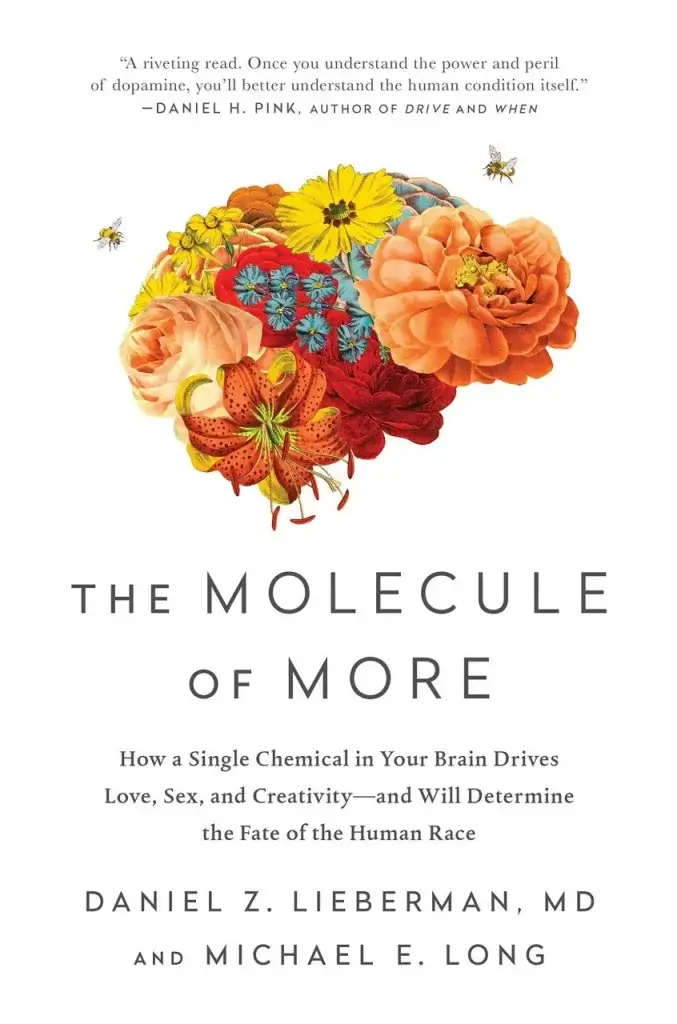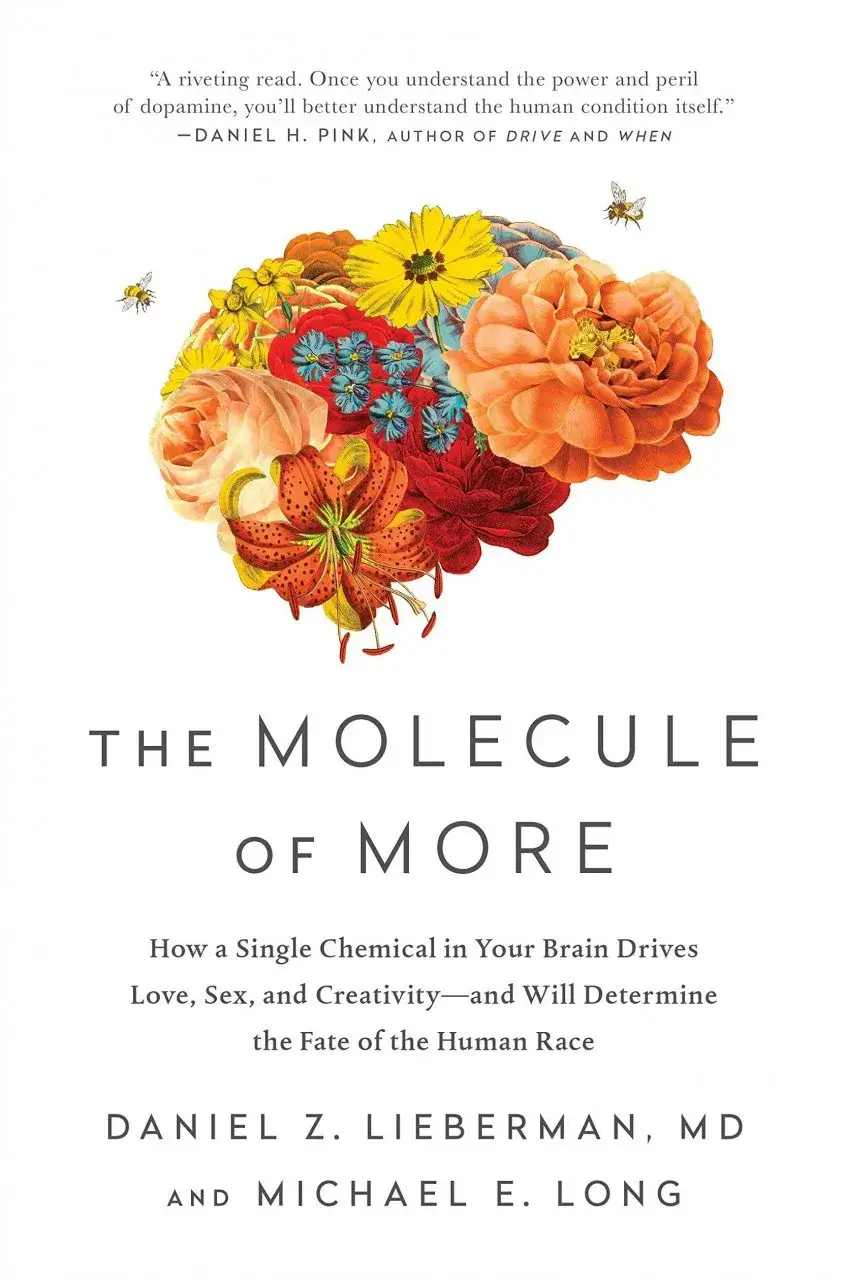
Ever wondered why humans are driven by a constant desire for more? This endless pursuit can be attributed to dopamine, a single molecule in our brain. In this blog post, we’ll dive into the insights from “The Molecule of More: How a Single Chemical in Your Brain Drives Love, Sex and Creativity,” written by Daniel Z.
Lieberman and Michael E. Long. Ready to explore the power of this tiny molecule? Let’s get started!
Key Takeaways
- Dopamine is a single molecule in our brain that drives our constant desire for more. It plays a vital role in motivation and influences our behavior.
- Dopamine affects love and relationships by creating feelings of pleasure and reward during moments of connection. However, too much dopamine can lead to relationship volatility.
- Addictive drugs can hijack the brain’s dopamine system, leading to tolerance and addiction. Dopamine overload can also impact decision-making abilities and impulse control.
- Techniques like setting realistic goals, practicing mindfulness, engaging in regular exercise, and creating routines can help manage dopamine desires and achieve higher satisfaction.
Understanding Dopamine
Dopamine plays a vital role in our brains, driving motivation and influencing our behavior.
The role of dopamine in our brains
Dopamine is a very important part of our brains. It’s like the boss that tells our body what to do. Many times, it makes us want more of something good. In the past, this helped people stay alive by making them want more food or seek safety.
Today, dopamine still shapes how we act in big ways. This tiny chemical can stir up love and passion, help us think outside the box, or even push some people to risky behaviors like drug use.
Dopamine is not tied down by fear or right and wrong; it just wants more all the time!
Dopamine and motivation
Dopamine is a chemical in your brain that plays a big role in motivation. It makes you want to seek out things that bring you pleasure or make you feel good. When dopamine is released, it creates feelings of reward and satisfaction, which can motivate you to keep doing certain activities.
This chemical is important for our survival because it drives us to do things like eat, drink water, and find shelter. In everyday life, dopamine can push us to work towards goals or pursue hobbies we enjoy.
It’s what gives us that boost of energy and excitement when we’re motivated to achieve something. So the next time you feel that burst of energy pushing you forward, remember that it might be your friend dopamine at work!
Dopamine and Love
Dopamine plays a crucial role in love and relationships, influencing attraction, attachment, and the overall experience of being in love.
The effects of dopamine on love and relationships
Dopamine, a chemical in your brain, has powerful effects on love and relationships. It plays a key role in attraction and attachment. When dopamine is released during moments of connection with someone you care about, it creates feelings of pleasure and reward.
This can make falling in love an exciting and intense experience. However, too much dopamine can also contribute to relationship volatility. It can lead to impulsive behaviors and seeking out new sources of stimulation.
Understanding the effects of dopamine on love can help us navigate the ups and downs of relationships more effectively.
The role of dopamine in attraction and attachment
Dopamine plays a big role in attraction and attachment. It’s a chemical in your brain that makes you feel good when you’re around someone you like. Dopamine is released when you see or think about the person, which gives you those warm and fuzzy feelings.
It also helps create strong emotional bonds between people, making them feel connected and attached to each other. So, if you ever wondered why you can’t stop thinking about someone or why you feel so drawn to them, it’s all because of dopamine!
Dopamine and Addiction
Dopamine overload caused by addictive drugs wreaks havoc on our brains, leading to detrimental consequences and the destruction of our reward system.
How addictive drugs affect our dopamine system
Addictive drugs can have a profound impact on our dopamine system. Dopamine is a neurotransmitter in the brain that plays a key role in pleasure and reward. When we do something pleasurable, like eating delicious food or spending time with loved ones, dopamine is released in our brains, making us feel good.
However, addictive drugs can hijack this system by flooding the brain with an excessive amount of dopamine. This flood of dopamine creates an intense feeling of euphoria and reinforces the desire to use the drug again.
Over time, repeated drug use changes the brain’s chemistry and makes it less sensitive to dopamine. This leads to tolerance, where more of the drug is needed to achieve the same level of pleasure.
The consequences of dopamine overload
Dopamine overload can have significant consequences on our well-being and behavior. When we are constantly seeking more stimulation and experiences, it can lead to addictive behaviors.
This means that we may become dependent on activities or substances that increase dopamine levels in our brains, like drugs or gambling. Over time, this can lead to tolerance, where larger amounts of dopamine are needed to achieve the same level of pleasure.
Dopamine overload can also impact our decision-making abilities and impulse control. We may find ourselves making impulsive choices without fully considering the long-term consequences.
Controlling Dopamine
Learn techniques to manage your dopamine desires and understand the impact of dopamine on your behavior.
Techniques for managing our dopamine desires
Managing our dopamine desires is important for maintaining a healthy and balanced life. To control the urge for constant stimulation, there are some techniques you can practice. One technique is setting realistic goals and breaking them down into smaller achievable steps.
This way, you can experience the satisfaction of accomplishing each step along the way, which releases small bursts of dopamine. Another technique is practicing mindfulness and being present in the moment.
By focusing on what you are currently doing or experiencing, you can reduce distractions that may trigger your desire for more dopamine-inducing activities. It’s also helpful to engage in regular physical exercise as it boosts endorphins, another feel-good chemical in your brain that helps regulate dopamine levels.
Lastly, creating a routine and sticking to it can help create structure in your life and minimize impulsive behaviors driven by dopamine cravings. By incorporating these techniques into your daily life, you can gain better control over your dopamine desires and achieve higher levels of satisfaction and contentment.
The impact of dopamine on our behavior
Dopamine, a chemical in the brain, has a big impact on how we behave. It’s like a little messenger, sending signals to different parts of our brain and making us want things. Dopamine makes us feel motivated and excited about things we enjoy.
It can make us crave more pleasure and seek out new experiences. That’s why sometimes we might feel really determined to achieve something or try something new. But dopamine can also lead to problems if it gets out of control.
Too much dopamine can lead to addiction, where we constantly need more and more of something to feel satisfied. Understanding how dopamine affects our behavior can help us find ways to manage our desires and live balanced lives.
Dopamine and Creativity
Dopamine can either lead to great creative genius or mental illness, as there is a link between dopamine and mental time travel.
How dopamine can lead to creative genius or mental illness
Dopamine, a chemical in your brain, can have a big impact on your creativity and mental health. When dopamine levels are just right, it can lead to amazing creative ideas and problem-solving skills.
It’s like the fuel for your imagination. But when there is too much or too little dopamine, it can cause problems. Too much dopamine has been linked to mental illnesses like schizophrenia and bipolar disorder.
On the other hand, having too little dopamine can make it hard for you to feel pleasure or motivation. So finding the right balance is key for both creative genius and good mental health.
The link between dopamine and mental time travel
Dopamine, a chemical in your brain, is not just involved in love and creativity. It also plays a part in something called “mental time travel.” This means that dopamine can help you imagine the future or remember events from the past.
Researchers have found that when dopamine levels are high, people are better able to envision possible future scenarios and plan ahead. On the other hand, when dopamine levels are low, it becomes harder to think about the future and make decisions.
So why does this matter? Well, it turns out that mental time travel is an important aspect of our daily lives. Being able to anticipate future events helps us set goals and work towards them.
Remembering past experiences allows us to learn from mistakes and make better choices in the present.
However, too much dopamine can lead to problems as well. Excessive amounts of this chemical can cause individuals to get stuck in certain thoughts or become fixated on particular memories.
Conclusion
In conclusion, “The Molecule of More” provides a captivating exploration of dopamine’s role in driving love, sex, and creativity. Through a combination of scientific research and personal anecdotes, the book delves into the intricate workings of our brain chemistry and how dopamine influences our desires and motivations.
By understanding the power of dopamine, we can gain insight into our own behaviors and work towards finding balance between seeking pleasure and achieving serenity. Ultimately, this single chemical has the potential to shape not only individual lives but also the fate of the entire human race.
Finding balance between dopamine and serenity
In our fast-paced world, finding balance between the dopamine-driven desire for more and the need for serenity is crucial. Dopamine, the chemical of desire in our brains, can lead us to constantly seek stimulation and experiences.
While this drive may have been helpful for survival in early humans, it can become overwhelming in modern society. The book “The Molecule of More” explores techniques for managing our dopamine desires and maintaining a sense of serenity.
By understanding how dopamine influences our behavior, we can learn to navigate its effects and find a healthy balance between seeking pleasure and finding peace.
The potential for dopamine to determine the fate of the human race
Dopamine, the chemical in our brains that drives desire and motivation, has the potential to play a significant role in shaping the future of humanity. According to “The Molecule of More,” dopamine’s influence on our behavior can impact important aspects of life, such as love, creativity, and even addiction.
Understanding how dopamine works and learning how to manage its effects may be crucial for finding balance in our lives. By exploring the complexities of this neurotransmitter and its impact on human behavior, we can gain valuable insights into ourselves and potentially shape a better future for all of us.
FAQs
1. What is the book “The Molecule of More” about?
“The Molecule of More” talks about how dopamine, a brain chemical, affects love, sex and creativity.
2. How do neurotransmitters like dopamine impact human behavior?
Dopamine impacts neurological processes leading to pleasure-seeking behavior, shaping traits, political beliefs and emotional responses.
3. Does Dopamine relate to survival instincts in humans?
Yes! Human evolution used dopamine for our survival instincts and cognitive functions like focusing on tasks or solving problems.
4. Can too much Dopamine lead to addiction?
When hormones such as Dopamine fill the brain’s receptors often, it can lead to addiction and tolerance due to repeated use.
5. Is there a link between serotonin and dopamine?
Both are neurotransmitters but they have different roles with Serotonin impacting mood while Dopamine drives desire.





